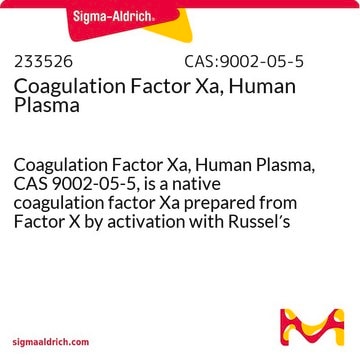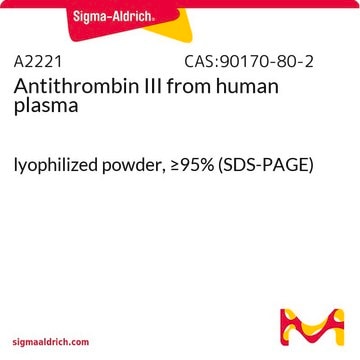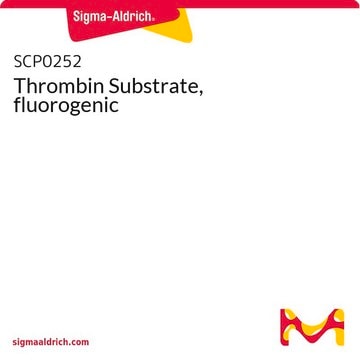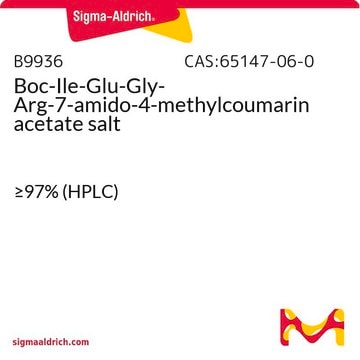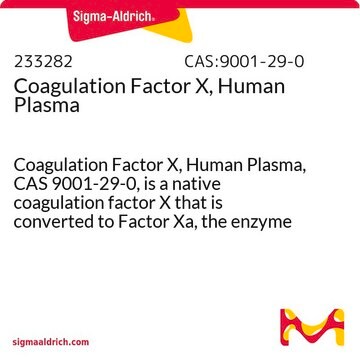F3301
Factor Xa chromogenic substrate
chromogenic, ≥90% (HPLC), solid
Synonym(s):
CH3OCO-D-CHA-Gly-Arg-pNA-AcOH
Sign Into View Organizational & Contract Pricing
All Photos(1)
About This Item
Recommended Products
product name
Factor Xa chromogenic substrate, solid
Assay
≥90% (HPLC)
Quality Level
form
solid
mol wt
apparent mol wt 622.7
solubility
methanol: water (1:9): 25 mg/mL
storage temp.
2-8°C
Application
Factor Xa chromogenic substrate has been used in factor Xa protease assay for placenta organelle protein and Prospirobolus joannsi.
Biochem/physiol Actions
Factor Xa chromogenic substrate contains peptide sequence Bz-Ile-Glu-Gly-Arg-pNA. Factor Xa mediates the release of p-NA chromogen post hydrolysis of substrate which is measurable photometrically.
Physical properties
KM for human factor Xa is ~0.8mM
Storage Class Code
11 - Combustible Solids
WGK
WGK 3
Flash Point(F)
Not applicable
Flash Point(C)
Not applicable
Personal Protective Equipment
dust mask type N95 (US), Eyeshields, Gloves
Certificates of Analysis (COA)
Search for Certificates of Analysis (COA) by entering the products Lot/Batch Number. Lot and Batch Numbers can be found on a product’s label following the words ‘Lot’ or ‘Batch’.
Already Own This Product?
Find documentation for the products that you have recently purchased in the Document Library.
Joannsin, a novel Kunitz-type FXa inhibitor from the venom of Prospirobolus joannsi
Luan N, et al.
Thrombosis and Haemostasis, 117(06), 1031-1039 (2017)
Pathology consultation on anticoagulation monitoring: factor X-related assays
Wool GD and Lu CM
American Journal of Clinical Pathology, 140(5), 623-634 (2013)
Zilei Duan et al.
Cellular and molecular life sciences : CMLS, 79(6), 309-309 (2022-05-22)
Blood clot formation induced by dysfunctional coagulation is a frequent complication of coronavirus disease 2019 (COVID-19) and a high-risk factor for severe illness and death. Neutrophil extracellular traps (NETs) are implicated in COVID-19-induced immunothrombosis. Furthermore, human cathelicidin, a NET component
Probing substrate-induced conformational alterations in adrenoleukodystrophy protein by proteolysis
Guimaraes CP, et al.
Journal of Human Genetics, 50(2), 99-99 (2005)
Ning Luan et al.
Thrombosis and haemostasis, 117(6), 1031-1039 (2017-03-10)
The repugnatorial glands of millipedes release various defensive chemical secretions. Although varieties of such defensive secretions have been studied, none of them is protein or peptide. Herein, a novel factor Xa (FXa) inhibitor named joannsin was identified and characterised from repugnatorial glands
Our team of scientists has experience in all areas of research including Life Science, Material Science, Chemical Synthesis, Chromatography, Analytical and many others.
Contact Technical Service



